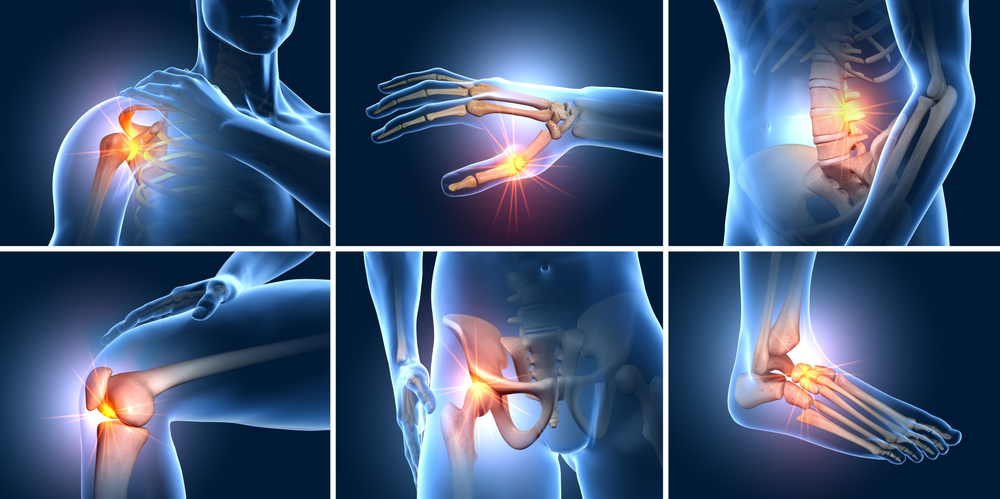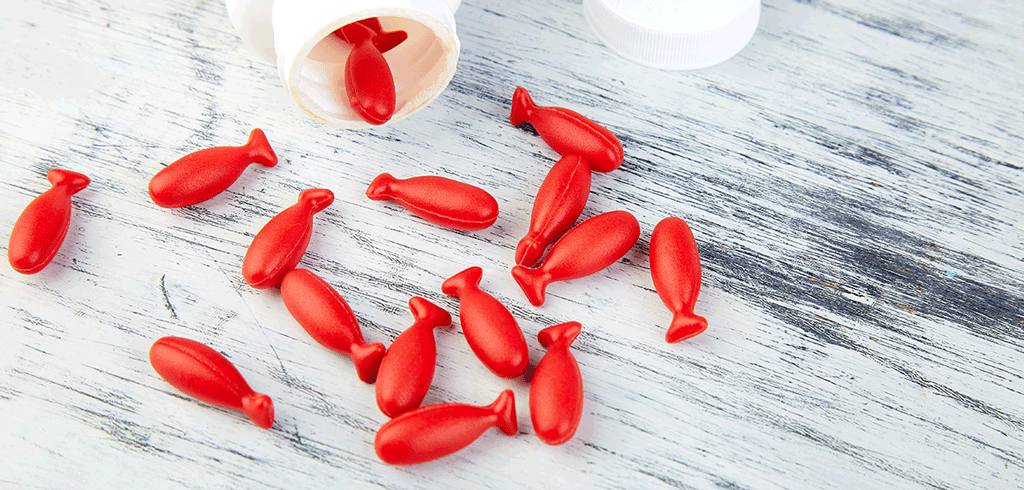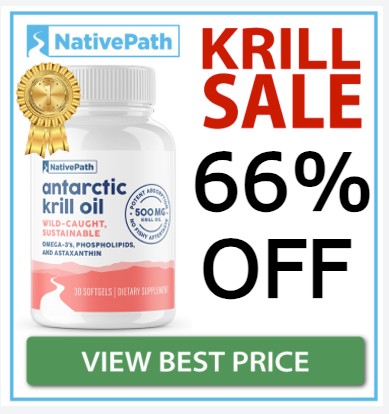A list of the top benefits of krill oil, an omega-3 supplement.
Due to the many benefits of Krill oil, it’s quickly becoming the best Omega-3 supplement for people who want to reduce joint pain, improve heart health, and more.
Krill oil comes from krill, tiny crustaceans found in the sea. Like fish oil, it is rich in Omega-3 fats that have been shown to support heart, brain, and joint health. However, growing research shows that krill oil may offer even more benefits than fish oil. This is because our bodies may be able to absorb the fatty acids in krill oil more easily [1].
Another difference between krill oil and fish oil is that krill oil also contains an antioxidant called astaxanthin, which is missing from most fish oil supplements. Astaxanthin has been shown to improve shelf-life [2], preventing oxidation — supplements going off before they’ve been taken.
But what sort of health benefits does krill oil offer? Here are five of the incredible benefits offered by this surprising supplement.
Krill Oil Reduces Joint and Arthritis Pain


Krill oil has anti-inflammatory properties, which means it can be used to fight joint pain and arthritis, reducing stiffness, swelling, and more.
Studies have found that krill oil reduces pain in people with rheumatoid arthritis and osteoarthritis by up to 30% [3]. People suffering from knee pain have also been shown to significantly reduce their pain by taking krill oil [4], along with improving their range of movement. This was true even while they were standing.
Krill Oil Lowers Cholesterol and Blood Pressure


Krill oil addresses many factors that are risks for heart disease. It has been shown to lower total cholesterol levels while working to increase your levels of good (high-density lipoprotein, or HDL) cholesterol [5]. In fact, krill oil is much more effective than fish oil at reducing cholesterol, even when taken at lower levels.
Krill oil can also lower blood pressure [6]. It does this by reducing inflammation and triglycerides — a type of fat (lipid) in the blood that can be harmful to your blood vessels.
Krill Oil Lowers Inflammation


Omega-3 supplements have been shown to have many benefits when it comes to reducing inflammation. But krill oil may be even better than fish oil and other Omega-3 sources thanks to its astaxanthin.
Astaxanthin’s anti-inflammatory benefits make krill oil very effective as a health supplement, reducing chronic inflammation by up to 30% after one month [7]. In fact, studies have found that taking a dose of krill oil daily is even better at lowering inflammation than taking twice as many purified Omega-3s each day [8]. This is one of the key benefits of krill oil.
Krill Oil Helps With Weight Loss


Sometimes people worry that taking Omega-3 fatty acids will lead them to put on weight, but in fact, the opposite is true. Omega-3s have been shown to be effective at supporting weight loss by increasing metabolism, and krill oil is no different.
Krill oil helps produce L-carnitine, a chemical that the body uses to break down fatty acids into fuel. This means that krill oil helps your body burn fat more effectively [9], helping you shed extra pounds during exercise and day-to-day life. Taking krill oil along with probiotics is a great way to support weight loss efforts.
Krill Oil Is Good For The Brain


Omega-3s are important for brain health, with 60% of the brain’s dry weight being fat. Krill oil contains a fatty acid called DHA, which is important for brain function. In fact, studies have found that krill oil significantly improves memory and concentration in older people [10].
Omega-3 fatty acid supplements have also been found to have a positive effect on dementia and Alzheimer’s disease [11], particularly when combined with an antioxidant — such as krill oil’s astaxanthin. Similarly, probiotics have also been shown to have a positive impact on memory and cognition.
Which Krill Oil Is Best?
It’s clear that krill oil comes with many health benefits, including lower blood pressure and cholesterol, weight loss, and better memory and concentration. But how can you make sure you’re taking the best krill oil supplement available? First, check the supplement’s ingredients. You want to make sure that any krill oil supplement you buy includes phospholipids, astaxanthin, choline, and Omega-3 fatty acids (EPA and DHA). These nutrients make krill oil uniquely effective.
Second, make sure you’re buying from a reliable vendor. Rather than going with the cheapest option and risking a fake or low-quality supplement, check that the vendor you’re buying from has good reviews and third-party certifications to confirm quality. A good place to start is a reputable, frequently updated expert review site, such as The Top 5 Krill Oil Supplements in 2022 from Natural Reviews.
Research shows that the best krill oil supplement is more effective and more easily absorbed than even the best fish oil supplement, coming with a wide range of health benefits. Also quality is key! Don’t miss out on the power of krill oil supplements — make sure you’re buying a high-quality product.
[2] Aracati, Fernanda Mayumi et al: “Astaxanthin improves the shelf-life of tilapia filets stored under refrigeration”, August 15 2022, pubmed.ncbi.nlm.nih.gov/35038166/
[3] Deutsch, Luisa: “Evaluation of the effect of Neptune Krill Oil on chronic inflammation and arthritic symptoms”, February 2007, pubmed.ncbi.nlm.nih.gov/17353582/
[4] Suzuki, Yoshio: “Krill Oil Improves Mild Knee Joint Pain: A Randomized Control Trial”, October 4 2016, pubmed.ncbi.nlm.nih.gov/27701428/pubmed.ncbi.nlm.nih.gov/27701428/
[5] Bunea, Ruxandra: “Evaluation of the effects of Neptune Krill Oil on the clinical course of hyperlipidemia”, December 2004, pubmed.ncbi.nlm.nih.gov/15656713/
[6] Costanzo, Manuela et al: “Krill oil reduces intestinal inflammation by improving epithelial integrity and impairing adherent-invasive Escherichia coli pathogenicity”, January 2016, pubmed.ncbi.nlm.nih.gov/26493628/
[7] Deustch, Luisa: “Evaluation of the effect of Neptune Krill Oil on chronic inflammation and arthritic symptoms”, February 2007, pubmed.ncbi.nlm.nih.gov/17353582/
[8] Cicero, Arrigo F G et al: “Lipid-lowering and anti-inflammatory effects of Omega 3 ethyl esters and krill oil: a randomized, cross-over, clinical trial”, June 1 2016,pubmed.ncbi.nlm.nih.gov/27279841/
[9] Dewei Sun et al: “Effects of Antarctic krill oil on lipid and glucose metabolism in C57BL/6J mice fed with high fat diet”, November 21 2017, ncbi.nlm.nih.gov/pmc/articles/PMC5697064/
[10] Konagai, Chizuru: “Effects of krill oil containing n-3 polyunsaturated fatty acids in phospholipid form on human brain function: a randomized controlled trial in healthy elderly volunteers”, September 19 2013, pubmed.ncbi.nlm.nih.gov/24098072/
[11] Cole, Greg M. et al: “Omega-3 fatty acids and dementia”, June 12 2009, ncbi.nlm.nih.gov/pmc/articles/PMC4019002/








